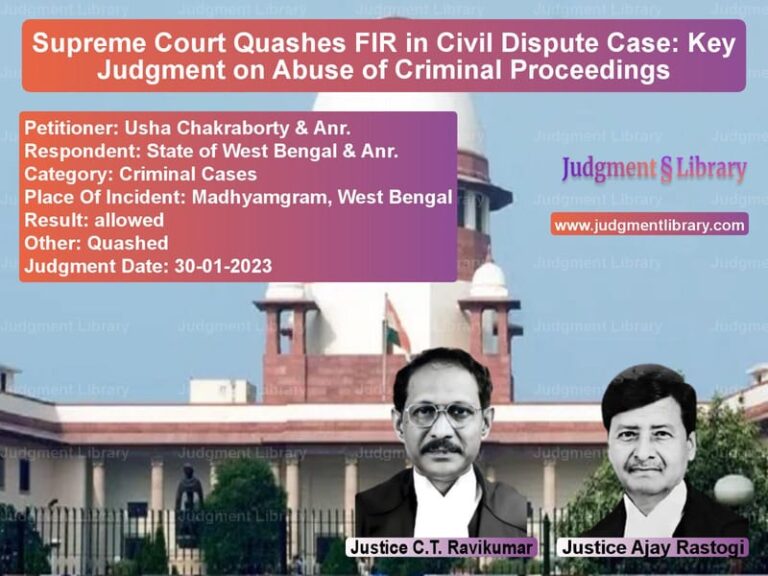Supreme Court Upholds Mesne Profits Inquiry in Long-Standing Property Dispute
The case of Choudappa & Anr. vs. Choudappa (Since Deceased) By LRs & Ors. involved a long-standing property dispute dating back to 1963, where the Supreme Court ruled on the validity of a mesne profits inquiry ordered in 1973. The Court, in its judgment dated September 3, 2024, upheld the Karnataka High Court’s decision, rejecting the petitioners’ plea that the mesne profits inquiry was time-barred. The ruling emphasized that an inquiry for mesne profits is a continuation of the original suit and does not require a fresh application.
This case clarifies key legal principles under Order XX Rule 12 of the Code of Civil Procedure, 1908 (CPC) and the non-applicability of the Limitation Act to ongoing proceedings related to a final decree.
Background of the Case
The dispute originated from a suit for recovery of possession and correction of mutation entries concerning agricultural land in Karnataka, filed in 1963. The suit was decreed in favor of the respondents on July 12, 1973, with specific directions:
- The respondents were granted possession of the suit land.
- An inquiry was directed under Order XX Rule 12 CPC for the determination of mesne profits (compensation for unlawful possession).
The petitioners, who were in possession of the land, filed an appeal, which was dismissed in 1980, making the 1973 decree final. However, the respondents applied for execution of the decree in 1993 and obtained possession of the land in 2005.
Legal Proceedings
Application for Mesne Profits Inquiry
- In 2014, the respondents filed an application under Order XX Rule 12 CPC for determination of mesne profits.
- The petitioners objected, arguing that the application was a new execution proceeding and was barred by limitation.
Trial Court Decision
- The Trial Court rejected the petitioners’ objection, ruling that:
- The mesne profits inquiry was already directed in the 1973 decree.
- It was not a fresh execution proceeding but a continuation of the original decree.
- The application was therefore not time-barred.
High Court Ruling
- The petitioners challenged the Trial Court’s ruling before the Karnataka High Court, which dismissed their revision petition on July 22, 2022.
- The High Court relied on Supreme Court precedents and upheld the Trial Court’s findings that mesne profits inquiries do not have a limitation period.
Appeal Before the Supreme Court
The petitioners approached the Supreme Court, arguing:
- The 2014 application was in the nature of a second execution, which was barred by limitation.
- The mesne profits inquiry should have been initiated within a reasonable time after 1973.
- Allowing the application would lead to perpetual litigation.
Supreme Court’s Observations
The Supreme Court, comprising Justices Pankaj Mithal and R. Mahadevan, upheld the High Court’s ruling and dismissed the petition.
1. Mesne Profits Inquiry as a Continuation of the Suit
- The Court reaffirmed that an inquiry into mesne profits is not a new proceeding but a continuation of the original suit.
- It cited Kattukandi Edathil Krishnan & Anr. v. Kattukandi Edathil Valsan & Ors. (2022), which held that a final decree can be prepared at any time after a preliminary decree.
2. No Limitation Period for Inquiry Under Order XX Rule 12 CPC
- The Court ruled that mesne profits determination is an inherent right of the decree-holder and does not require a separate application.
- It cited North Eastern Chemicals Industries (P) Ltd. v. Ashok Paper Mill (Assam) Ltd. (2023), where it was held that where no limitation is prescribed, courts must decide based on the facts and circumstances.
3. Petitioners’ Objection Was Unjustified
- The Court found that the petitioners deliberately delayed proceedings by raising objections despite the 1973 decree being final.
- It ruled that the objections were an attempt to evade payment of mesne profits.
Important Excerpts from the Judgment
“An inquiry for mesne profits directed in a decree is not an independent proceeding but a continuation of the original suit. It does not require a separate application and is not subject to limitation.”
“Where no limitation is provided, courts must take a holistic view of the circumstances before rejecting a claim on delay or laches.”
Final Judgment
The Supreme Court ruled:
- The appeal was dismissed, and the High Court’s order was upheld.
- The mesne profits inquiry must proceed before the Trial Court without further delay.
- The petitioners were directed to participate in the inquiry process.
Implications of the Judgment
This ruling has several important legal and practical implications:
- Clarity on Mesne Profits: The decision reaffirms that mesne profits inquiries do not lapse due to delay.
- Protection of Decree-Holders: The judgment prevents defendants from using technical objections to evade paying rightful compensation.
- Judicial Efficiency: Courts must ensure that decree-holders are not denied relief due to prolonged delays by judgment-debtors.
The Supreme Court’s ruling establishes a crucial precedent ensuring that mesne profits, once directed in a decree, remain enforceable even decades later, reinforcing the principle that justice should not be defeated by procedural objections.
Petitioner Name: Choudappa & Anr..Respondent Name: Choudappa (Since Deceased) By LRs & Ors..Judgment By: Justice Pankaj Mithal, Justice R. Mahadevan.Place Of Incident: Karnataka, India.Judgment Date: 03-09-2024.
Don’t miss out on the full details! Download the complete judgment in PDF format below and gain valuable insights instantly!
Download Judgment: choudappa-&-anr.-vs-choudappa-(since-dec-supreme-court-of-india-judgment-dated-03-09-2024.pdf
Directly Download Judgment: Directly download this Judgment
See all petitions in Property Disputes
See all petitions in Damages and Compensation
See all petitions in Public Interest Litigation
See all petitions in Judgment by Pankaj Mithal
See all petitions in Judgment by R. Mahadevan
See all petitions in dismissed
See all petitions in supreme court of India judgments September 2024
See all petitions in 2024 judgments
See all posts in Civil Cases Category
See all allowed petitions in Civil Cases Category
See all Dismissed petitions in Civil Cases Category
See all partially allowed petitions in Civil Cases Category







